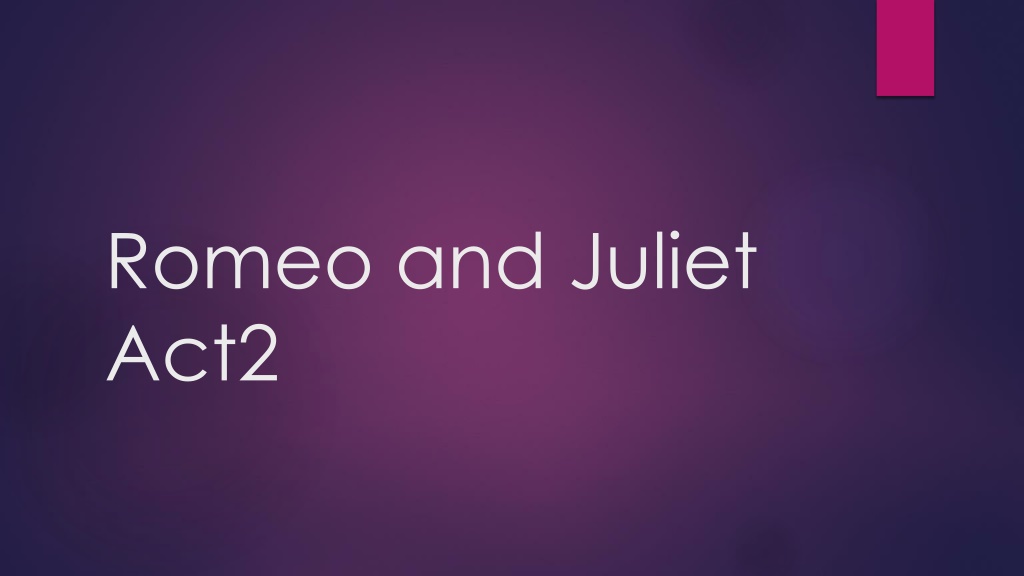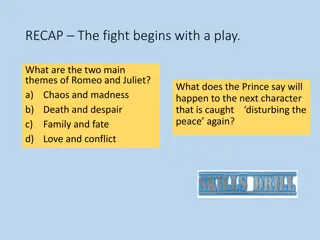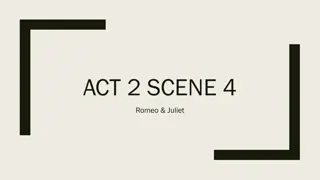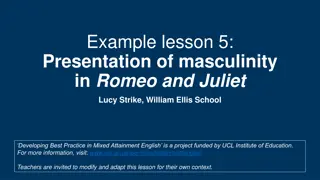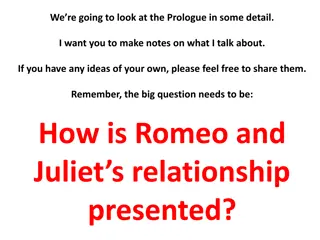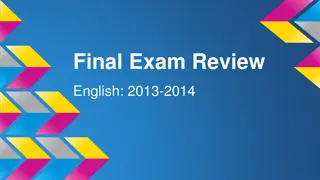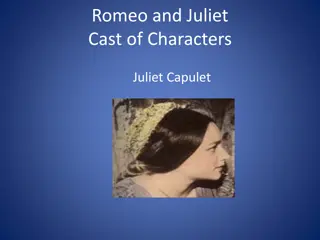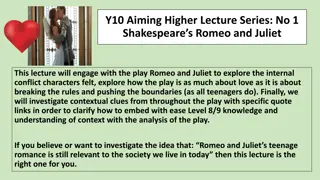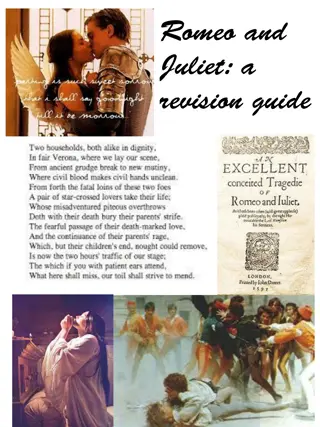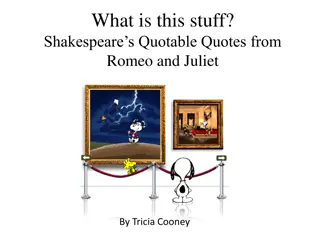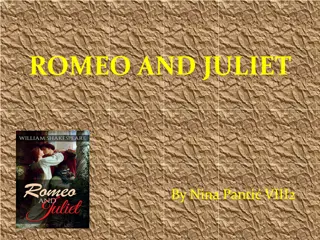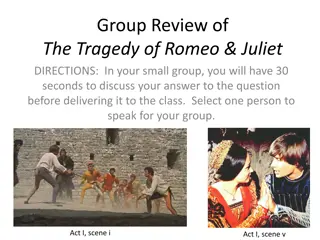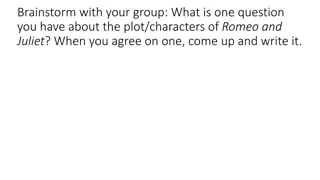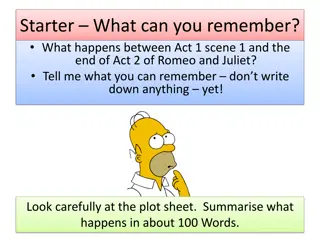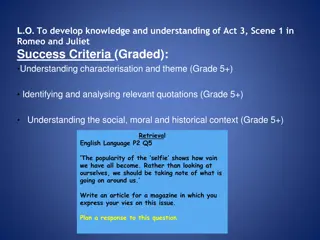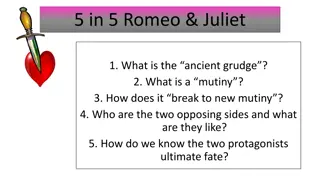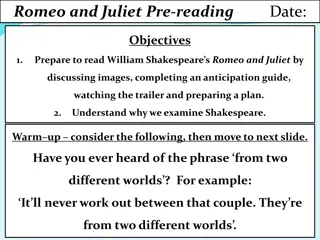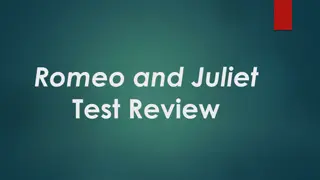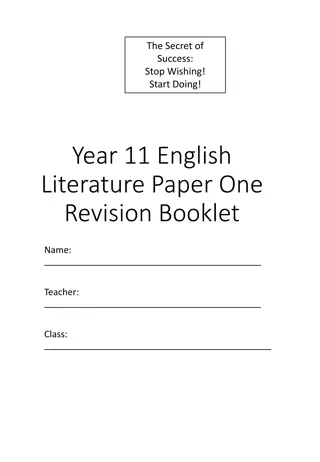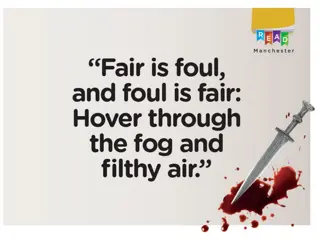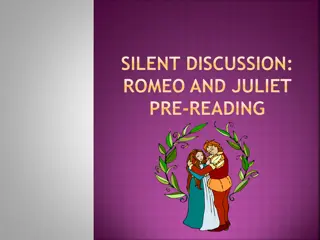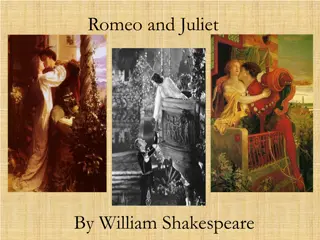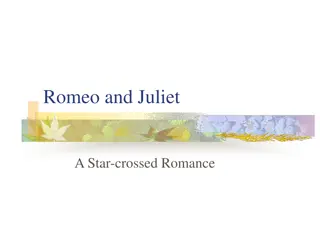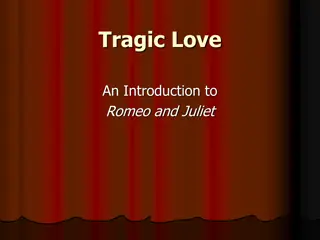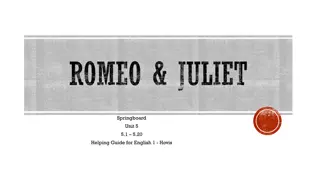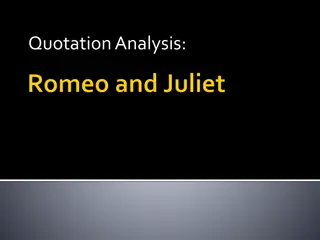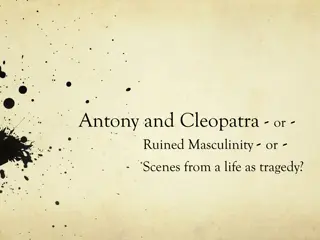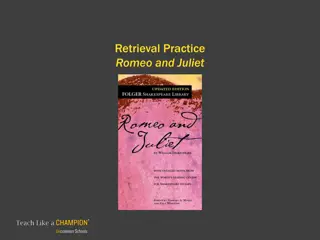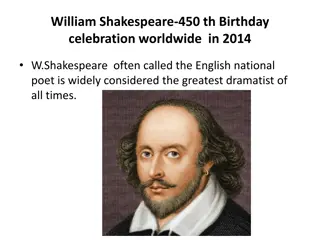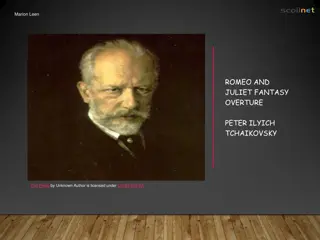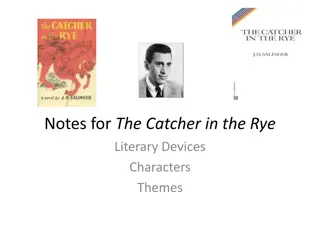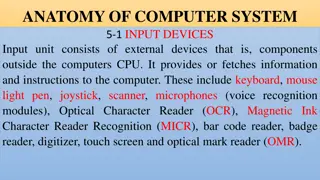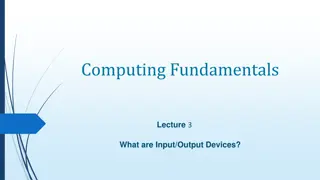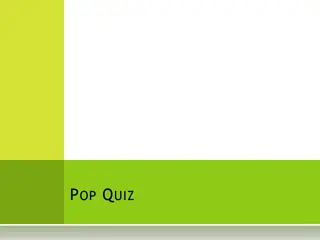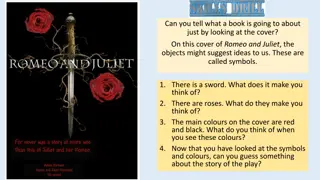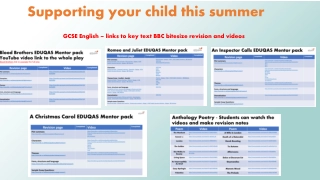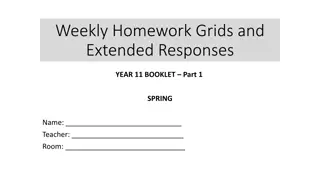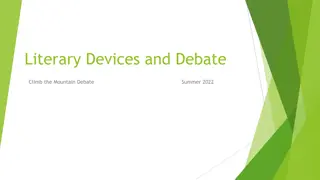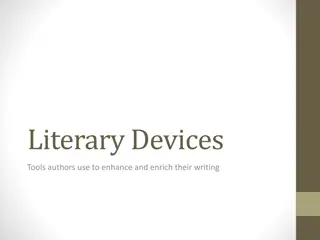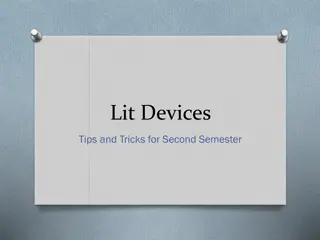Analysis of Literary Devices in Romeo and Juliet Act 2
In Act 2 of Romeo and Juliet, the characters use various literary devices such as allusion, dramatic irony, hyperbole, and foreshadowing. Mercutio mistakenly believes Romeo is still in love with Rosaline, showcasing dramatic irony. Additionally, Friar Lawrence's words foreshadow the danger in Romeo and Juliet's love. Shakespeare employs these devices to add depth and complexity to the characters and their interactions.
Download Presentation

Please find below an Image/Link to download the presentation.
The content on the website is provided AS IS for your information and personal use only. It may not be sold, licensed, or shared on other websites without obtaining consent from the author. Download presentation by click this link. If you encounter any issues during the download, it is possible that the publisher has removed the file from their server.
E N D
Presentation Transcript
Romeo and Juliet Act2
Literary devices Mercutio: Romeo! Madman! Passion! Lover! Show yourself in the form of a sigh. Speak one rhyme, and I ll be satisfied. Just cry out, Ah me! Just say love and dove. Say just one lovely word to my good friend Venus. Just say the nickname of her blind son Cupid, the one who shot arrows so well in the old story. Romeo doesn t hear me. He doesn t stir. He doesn t move. The silly ape is dead, but I must make him appear. I summon you by Rosaline s bright eyes, by her high forehead and her red lips, by her fine feet, by her straight legs, by her trembling thighs. Allusion: Mercutio refers to the Roman goddess of love Venus and Cupid , the god of love. Dramatic Irony: Mercutio thinks that Romeo is still in love with Rosaline and that he is suffering because he didn t see her at the party whereas the readers know that Romeo is actually in love with Juliet and that he, leaving his friends, is actually trying to see her once more.
Literary devices The brightness of her cheeks would outshine the stars the way the sun outshines a lamp. If her eyes were in the night sky, they would shine so brightly through space that birds would start singing, thinking her light was the light of day. A hyperbole: an exaggeration of an idea.
Literary Devices: Friar Lawrence: Inside the little rind of this weak flower, there is both poison and powerful medicine. If you smell it, you feel good all over your body. But if you taste it, you die. There are two opposite elements in everything, in men as well as in herbs good and evil. Foreshadowing: when reading his words, the reader knows how sweet it is for Romeo to see Juliet and be close to her the smell of the flower is sweet , but at the same time the reader feels that something bad will happen in the future if they get married if you taste it, you die
Quotations: ROMEO It s easy for someone to joke about scars if they ve never been cut. What is the significance of such quotation said by Romeo after he left his friends and headed to see Juliet? This quotation shows how much Romeo s life centers around love. It is his top priority. He knows that someone like Mercutio will never understand how much Romeo is suffering simply because Mercutio has never been hurt or experienced true love. Mercutio is mocking Romeo and makes fun of his burning love or his emotional status all the time all the way.
What is a literary device used here by Shakespeare? And what is the significance of the yellow-highlighted sentences? JULIET (not knowing ROMEO hears her) Oh, Romeo, Romeo, why do you have to be Romeo? Forget about your father and change your name. Or else, if you won t change your name, just swear you love me and I ll stop being a Capulet. ROMEO (to himself) Should I listen for more, or should I speak now? JULIET (still not knowing ROMEO hears her) It s only your name that s my enemy. You d still be yourself even if you stopped being a Montague. What s a Montague anyway? It isn t a hand, a foot, an arm, a face, or any other part of a man. Oh, be some other name! What does a name mean? The thing we call a rose would smell just as sweet if we called it by any other name. Romeo would be just as perfect even if he wasn t called Romeo. Romeo, lose your name. Trade in your name which really has nothing to do with you and take all of me in exchange. ROMEO (to JULIET) I trust your words. Just call me your love, and I will take a new name. From now on I will never be Romeo again.
A Soliloquy: Juliet is talking to herself. This illustrates what she is thinking of. She thinks that no one else is listening to her. Shakespeare breaks the soliloquy by having Romeo, who is hiding in the garden, listen to every single word she says while she is oblivious of his presence. What s a Montague anyway? It isn t a hand, a foot, an arm, a face, or any other part of a man. What does a name mean? The thing we call a rose would smell just as sweet if we called it by any other name. Romeo would be just as perfect even if he wasn t called Romeo. What is the significance of the lines above said by Juliet? Juliet s words condemn the stupidity of men who fight over silly stuff and take pride in killing each other for trivial and stupid issues. She blames both families who are standing on her way to winning her beloved Romeo. She states that a man is a man or a woman is a woman by what he or she does not by the names they have.
What is the significance of the yellow-highlighted sentences? ROMEO: I love rich Capulet s daughter. I love her, and she loves me. We re bound to each other in every possible way, except we need you to marry us. I ll tell you more later about when and where we met, how we fell in love, and how we exchanged promises, but now I m begging you: please, agree to marry us today. FRIAR LAWRENCE: Holy Saint Francis, this is a drastic change! Have you given up so quickly on Rosaline, whom you loved so much? Then young men love with their eyes, not with their hearts. Jesus and Mary, how many tears did you cry for Rosaline? How many salty tear-drops did you waste salting a love you never tasted? The sun hasn t yet melted away the fog you made with all your sighs. The groans you used to make are still ringing in my old ears. There s still a stain on your cheek from an old tear that hasn t been washed off yet. If you were ever yourself, and this sadness was yours, you and your sadness were all for Rosaline. And now you ve changed? Then repeat this after me: you can t expect women to be faithful when men are so unreliable. Friar Lawrence seems to be questioning Romeo s love for Juliet. He makes it seems as if it is just infatuation with another girl s beauty. He reminds Romeo of how strong his love for Rosaline was and how sudden and drastic a change happens in his life by saying he is falling in love with another girl. He calls his action unreliable and warns that women will never be faithful to lying men.
Lawrence doesnt believe that much in teen love nor does he accept the excessive way Romeo shows his love to Juliet. He thinks that life should be a balance between romance and reality. Too much love, according to Lawrence, is a way to boredom. Striking a balance is what he thinks is right. What is the significance of the lines below? FRIAR LAWRENCE: These sudden joys have sudden endings. They burn up in victory like fire and gunpowder. When they meet, as in a kiss, they explode. Too much honey is delicious, but it makes you sick to your stomach. Therefore, love each other in moderation. That is the key to long-lasting love. Too fast is as bad as too slow. Here comes the lady. Oh, a footstep as light as hers will never endure the rocky road of life. Lovers are so light they can walk on a spider web floating on a summer breeze, and yet not fall. That s how flimsy and unreal pleasure is.
Characterization: Juliet In Act1, she is that helpless girl who shows obedience when she promises her mother to consider Paris at the party. She is also that risky girl who takes her chances kissing a boy she has seen for the very first time in her life at the same party. She might be one of those girls who believe in love at first sight. She gets back to her senses when she finds out that the one who kissed her is the son of her father s worst enemy: Montague. Like Romeo, she seems overwhelmed with her love; she blames the stupidity of both families, stupidity that might stand in the way between her and her beloved. She is not the regular kind of girls who would play coy and hard-to-get in order to keep boys attached to her; when she talks to herself in the balcony, she admits her love for Romeo, and upon seeing him in the garden, she makes it clear to him that she will never pretend to be of good manners by denying what she has just said. She confesses her love to him and asks for his honest answer whether he truly loves her or not.
